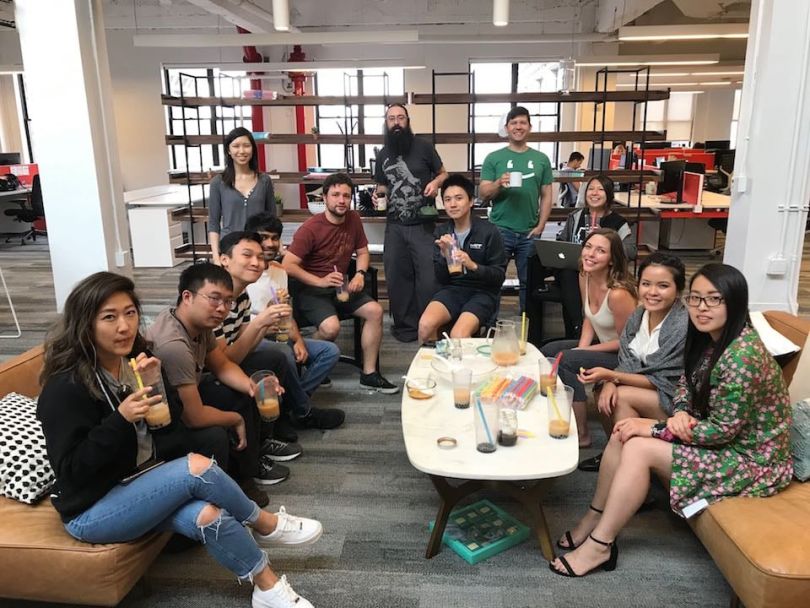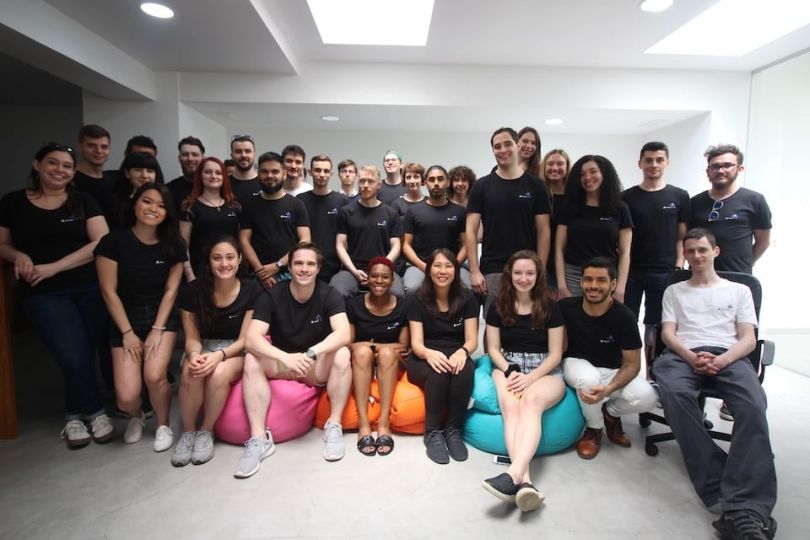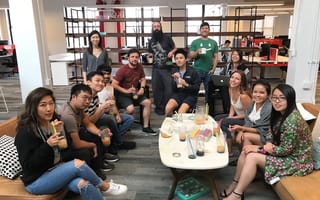In the startup world, mythology abounds around the moments and ideas that produce successful companies. So what are some of the stories behind New York City’s most interesting tech startups, and how have those companies evolved since their early days?
In the first of a two-part series, New York founders take us into the apartments, conferences and co-working spaces where they first hatched bold business ideas, and outline how their focus and mission has changed — or not — since then.

In the words of your elderly grandfather, “everyone texts these days.” And not only does everyone text their friends and family — they want to communicate with their favorite brands via text message, too. Braze makes this magic happen, offering machine learning to help design intelligent and individualized customer service messaging.
Co-founder and CEO Bill Magnuson described the “New York moment” that first brought Braze’s founding team together.
Tell us briefly about your founding story. What’s one thing people outside (or even inside) your team might not know about how your company was founded?
Prior to Braze, CTO Jon Hyman and I worked as engineers at Bridgewater Associates, an institutional hedge fund headquartered in Westport, CT. On a fateful weekend in May of 2011, Jon and I decided to participate in the TechCrunch Disrupt Hackathon in NYC. Our project, Gilt-II, was a plugin for the flash sales site Gilt.com that allowed users to auction items in their shopping cart before actually buying them. The project won the judging round and afforded us an opportunity to present onstage later in the week.
A couple of days later, while Jon and I were walking back to the conference, I struck up a conversation with a stranger who was waiting to cross 11th Avenue in Manhattan. That stranger happened to be Bipul Sinha, a partner at Lightspeed Ventures and CEO at Rubrik. Bipul saw us onstage the next day at Disrupt presenting Gilt-II, and later introduced me to Mark Ghermezian, who had an idea to build a “check-in” SDK for mobile apps. Collectively, we decided to join forces, quit our full-time jobs, and form Appboy — which we later renamed Braze. Braze was founded out of a unique sequence of events: a hackathon and a serendipitous meeting on a random street corner in Manhattan — a true New York moment.
We’ve grown rapidly from a small startup in New York to one of the largest digital platforms in the world...”
How has the company evolved since those early days — and where do you see the company going next?
We’ve grown rapidly from a small startup in New York to one of the largest digital platforms in the world with offices in New York, London, San Francisco and Singapore. Customers — including Disney, Urban Outfitters, Peloton, Venmo and HBO — use our platform to facilitate real-time experiences to customers in a more authentic and human way. We currently manage the relationships of 1.8 billion monthly active users on behalf of our customers, and send tens of billions of personalized messages every month.
As we continue to grow and expand into new markets, our mission stays the same: we are constantly looking for ways to create stronger, more sustainable and valuable relationships between brands and customers with technology. We currently have 380 employees and are on track to hit 500 employees worldwide by the end of the year.

With a range of software products designed to evolve and mirror the latest cyber threats, White Ops effectively acts as an “immune system” for business customers all over the world. The white hat hackers specialize in fending off bot attacks, investigating individual web transactions for evidence of fraudulent or malicious activity.
Co-founder and President Michael J.J. Tiffany said the company’s mission continues to guide the company as it scales operations and its team.
Tell us briefly about your founding story. What’s one thing people outside (or even inside) your team might not know about how your company was founded?
We started working in the back of Singularity & Co, a sci-fi bookshop in DUMBO. To define our space, which was really just the tables we pulled together to sit at and work, I bought a skull painted in black chalkboard paint, which we could write on. This was our memento mori — a reminder to look at our actions in light of how we will look back at them at the end of our lives. As we were creating White Ops, we weren’t just trying to make money. There really are an infinite number of ways to make money. We were building a money-making platform to do meaningful work, taking on the kind of problems that, at the end of our lives, we would still feel proud to have taken on.
We have an important mission — to disrupt the profit centers of the world’s most scalable cyber crimes...”
How has the company evolved since those early days — and where do you see the company going next?
Today, White Ops is still a platform for its people to do meaningful work, but the size of “its people” has grown from four to more than 150 — and we’re still growing. We make vastly more money, but the centrality of our mission remains unchanged. We have an important mission — to disrupt the profit centers of the world’s most scalable cyber crimes — and we make money as a consequence of our pursuit of that mission, not the other way around. To some, that sounds naive, but it’s actually a great source of power. It’s literally easier to work hard when you believe in the inherent value of the work. That’s the not-so-secret secret to our kick-ass performance. From here, we are working hard to make our bot defense and fraud defense available to more of the companies who need it, across industries and markets. As our coverage grows, we make the internet more trustworthy, and as our revenue grows, we get to hire more people to work with.

MANTL builds digital banking software for community banks and credit unions, helping them reach new customers, lower costs and grow their bottomline. MANTL is working to expand its products and services to improve how community banks and credit unions serve and support local communities.
The goal of all this, as Founder and CEO Nathaniel Harley explained, is to help smaller financial institutions compete with the big banks, so that people and businesses continue to have a breadth of institutions to depend on for their financial wellbeing.
Tell us briefly about your founding story. What’s one thing people outside (or even inside) your team might not know about how your company was founded?
We initially set out to build a challenger bank, and we were well on our way. We had a viable product and raised seed capital. Then, a meeting with a potential partner inspired us to pivot to enterprise software. Rather than compete with banks, we improve their user experience and help them operate more like a fintech company. This way, our software can reach more people, faster.
Our mission at MANTL is to remove the frustrations caused by outdated financial technology. Community banks and credit unions play an important role in the U.S. economy – they offer better rates and necessary competition to the big banks. We’re passionate about preserving that role by partnering with them on their digital transformations.
Our aspirations have grown and we’re more confident than ever in our ability to execute on our vision.”
How has the company evolved since those early days — and where do you see the company going next?
The fact that our customers are asking us to tackle more of their business problems is really encouraging. Our aspirations have grown and we’re more confident than ever in our ability to execute on our vision.
We still have plenty of work to do within the account opening vertical. Our team is working on building new features, improving the omni-channel experience, expanding the end user needs we can meet, and improving analytics tools that help our customers make more informed business decisions. We’re looking for passionate people to build the future of banking with us.

Amplicare's software solutions are designed to keep pharmacies and patients connected, identifying methods for improving care-related interactions. By creating these added avenues for connection, the SaaS platform simultaneously works to help pharmacists grow their businesses.
Co-founder and CEO Matthew Johnson explained how the platform evolved from a Medicare-focused tool to a wider suite of digital tools.
Tell us briefly about your founding story. What’s one thing people outside (or even inside) your team might not know about how your company was founded?
We started Amplicare (called “iMedicare” at the time) back in January 2012, while I was finishing my pharmacy degree near Charlotte, NC. Before embarking on this adventure, Co-founder Flaviu Simihaian and I were leading software development workshops together. It became abundantly clear that pharmacists — who only wanted to help their patients — were lacking the patient-focused tools to do so effectively. Most people live within walking distance of a pharmacy today, and they remain the most accessible health care provider in the United States.
We realized that we had a tremendous opportunity to deliver technology that empowers these pharmacies to have a meaningful impact on a large number of patients. Our first product focused on making it easier for pharmacies to help their Medicare patients find the most cost-effective Medicare plan — a popular need for patients.
At Amplicare we work at the intersection of technology and healthcare.”
How has the company evolved since those early days — and where do you see the company going next?
The solutions we deliver continue to evolve and have gone beyond just helping Medicare patients. While this continues to change, our mission remains the same: to turn pharmacies into healthcare superheroes for their communities, and to impact 1 billion patients by 2030.
This is also why we’ve recently rebranded to Amplicare. The new name reflects our evolution from one product to providing a pharmacy software and data solution centered on the patient. At Amplicare we work at the intersection of technology and healthcare. We use our energy and knowledge to keep breaking down the complex barriers in healthcare.
We are in a time of massive healthcare consolidation and heated partisan debate that causes patients and community providers to suffer — losing money and getting tangled in bureaucratic hurdles. The same frustrations that inspired Amplicare Match are pushing us to keep going. Amplicare’s outlook is positive, and our goal is to continue evolving our health care data and technology solutions to a broader audience in the healthcare market to make healthcare more open, transparent and accessible.








